|
|
|
Sort Order |
|
|
|
Items / Page
|
|
|
|
|
|
|
| Srl | Item |
| 1 |
ID:
127236
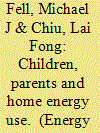

|
|
|
|
|
| Publication |
2014.
|
| Summary/Abstract |
While almost 30% of UK households include children, little research has attempted to present children's perspectives on home energy use. This study used focus groups with children and parents at two primary (elementary) schools in London, UK, to explore home energy use and energy feedback. Energy was found to be a little-discussed subject at home. Children derived more motivation to save energy from responsibility conferred by school activities than other (e.g. environmental) concerns, and some connected energy saving with dangers of using electricity (e.g. fire). Material and social constraints (e.g. access to outside space, parents' environmental attitudes) meant that it was sometimes difficult for children to save energy even when motivated. However, parents showed greater inclination to pay attention to energy saving when framed as supporting their child's learning than as a financial or environmental concern. Children were disinclined to reduce energy-consuming activities such as watching television, and while parents complained about children's energy use most saw it as a low priority issue. Policy implications of these findings are considered, and the approach employed is argued to be an effective way of investigating children's perceptions around energy use.
|
|
|
|
|
|
|
|
|
|
|
|
|
|
|
|
| 2 |
ID:
125650
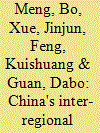

|
|
|
|
|
| Publication |
2013.
|
| Summary/Abstract |
In this study, we apply the inter-regional input-output model to explain the relationship between China's inter-regional spillover of CO2 emissions and domestic supply chains for 2002 and 2007. Based on this model, we propose alternative indicators such as the trade in CO2 emissions, CO2 emissions in trade and the regional trade balances of CO2 emissions. Our results do not only reveal the nature and significance of inter-regional environmental spillover within China's domestic regions but also demonstrate how CO2 emissions are created and distributed across regions via domestic and global production networks. Results show that a region's CO2 emissions depend on its intra-regional production technology, energy use efficiency, as well as its position and participation degree in domestic and global supply chains.
|
|
|
|
|
|
|
|
|
|
|
|
|
|
|
|
| 3 |
ID:
160844
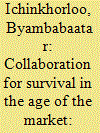

|
|
|
|
|
| Summary/Abstract |
Since 1990, Mongolia has experienced postsocialist transformation and the government-imposed ‘free market economy’. With the collapse of socialism and the former economic order, ordinary people in Mongolia have survived by engaging in diverse economic practices. The aim of this article is to give careful analysis of how people employed everyday economic practices around three key commodities – cashmere, scrap metal, and marmot pelts – to sustain their livelihoods in this postsocialist environment. Based on ethnographic field research, this article argues that social networks and kinship relations persisted through the socio-economic changes and radical reforms of the postsocialist period, creating the foundations for the diverse economic practices found in contemporary Mongolia. These practices served to distribute wealth equally and to sustain livelihoods after the government’s ‘failed’ privatization in the 1990s.
|
|
|
|
|
|
|
|
|
|
|
|
|
|
|
|
| 4 |
ID:
189954
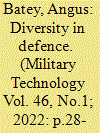

|
|
|
| 5 |
ID:
127238


|
|
|
|
|
| Publication |
2014.
|
| Summary/Abstract |
The article presents the findings of primary research carried out in Ghana and Senegal, which revisited the main assumptions behind the African Rural Energy Enterprise Development (AREED) initiative (2002-2012), and other donor-backed programmes, designed to promote small and medium-sized energy enterprises (energy SMEs). These assumptions were (1) that the lack of affordable local financing presented the most significant barrier to setting up and expanding energy SMEs, and (2) that these barriers would be overcome by a 'demonstration effect' whereby successful businesses, supported by donor-backed programmes, could in turn influence the commercial financial sector to invest in energy SMEs, thus triggering a virtuous circle of growth and profitability.
|
|
|
|
|
|
|
|
|
|
|
|
|
|
|
|
| 6 |
ID:
124710
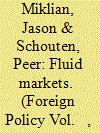

|
|
|
|
|
| Publication |
2013.
|
| Summary/Abstract |
It's a June night in Kinshasa, and rapper JB Mpiana's weekly VIP bash is just starting to heat up. Toned groupies splash like mermaids in a sunken pool. Middle-aged businessmen perch on the ledge above to watch. A minute before midnight, JB runs onstage among a huge posse of gyrating dancers in sunglasses. He rips into some of his biggest hits; a bombastic performer, he glides across the stage with a beefy grace, dressed in a hunter-orange jumpsuit and matching cap.
Most songs deal with the usual material, girls and gangbangers, in the Democratic Republic of the Congo's Lingala language. But when JB starts to chant the lyrics of his biggest hit of the night, the real purpose of this party -- festooned with yellow-and-blue banners advertising Primus, the beer that everyone would be drinking anyway, even at this lush downtown wine bar -- becomes obvious.
|
|
|
|
|
|
|
|
|
|
|
|
|
|
|
|
| 7 |
ID:
181888
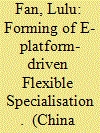

|
|
|
|
|
| Summary/Abstract |
E-commerce platforms have promoted the rise of consumer-demand-driven supply chains in the garment industry. This kind of supply chain has raised the demand for a new type of production organisation exemplified by low processing costs, small batches, multi-varieties, and quick reorders. Drawing on the insights of flexible specialisation theory, this paper proposes the concept of e-platform-driven flexible specialisation to describe this emerging production organisation form. This flexible specialisation is characterised by highly fragmented and informal production organisations such as husband-and-wife-run workshops and production units based on daily wage workers. In the context of a severe labour shortage in the garment industry, workers participate in the construction of these informal production organisations in order to obtain higher wages and work autonomy. However, the increase in informal employment also makes garment workers more atomised and vulnerable to social risks such as the outbreak of COVID-19. It is necessary to innovate labour relation negotiation modes to cope with the impacts of the rise of the platform economy on labour relations.
|
|
|
|
|
|
|
|
|
|
|
|
|
|
|
|
| 8 |
ID:
137986
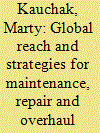

|
|
|
|
|
| Summary/Abstract |
The MRO defence sector is complex with multiple layers and interdependent players.
|
|
|
|
|
|
|
|
|
|
|
|
|
|
|
|
| 9 |
ID:
125741
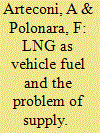

|
|
|
|
|
| Publication |
2013.
|
| Summary/Abstract |
The transport sector represents a major item on the global balance of greenhouse gas (GHG) emissions. Natural gas is considered the alternative fuel that, in the short-medium term, can best substitute conventional fuels in order to reduce their environmental impact, because it is readily available at a competitive price, using technologies already in widespread use. It can be used as compressed gas (CNG) or in the liquid phase (LNG), being the former more suitable for light vehicles, while the latter for heavy duty vehicles. The purpose of this paper is to outline the potential of LNG as vehicle fuel, showing positive and negative aspects related to its introduction and comparing the different supply options with reference to the Italian scenario, paying particular attention to the possibility of on site liquefaction. The analysis has highlighted that purchasing LNG at the regasification terminal is convenient up to a terminal distance of 2000 km from the refuelling station. The liquefaction on site, instead, asks for liquefaction efficiency higher than 70% and low natural gas price and, as liquefaction technology, the let-down plants at the pressure reduction points along the pipeline are the best option to compete with direct supply at the terminal.
|
|
|
|
|
|
|
|
|
|
|
|
|
|
|
|
| 10 |
ID:
093012


|
|
|
| 11 |
ID:
109213
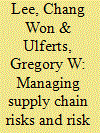

|
|
|
|
|
| Publication |
2011.
|
| Summary/Abstract |
Effective risk management in the supply chain of a company is a core business competency. In this case study, a major company in the Kaesong Industrial Complex in North Korea is used to evaluate strategic planning in supply chain risk management. In this company, four supply chain risks (financial, operational, human resources, and information) are identified and prioritized in terms of four strategies (cost, quality, delivery, and flexibility) using the analytic hierarchy process. The results are analyzed to provide supply chain risk mitigation strategies and their implications for the company. This study reinforces the importance of strategic planning for supply chain risk management in providing competitive advantage and future survival.
|
|
|
|
|
|
|
|
|
|
|
|
|
|
|
|
| 12 |
ID:
127237
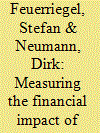

|
|
|
|
|
| Publication |
2014.
|
| Summary/Abstract |
Due to the integration of intermittent resources of power generation such as wind and solar, the amount of supplied electricity will exhibit unprecedented fluctuations. Electricity retailers can partially meet the challenge of matching demand and volatile supply by shifting power demand according to the fluctuating supply side. The necessary technology infrastructure such as Advanced Metering Infrastructures for this so-called Demand Response (DR) has advanced. However, little is known about the economic dimension and further effort is strongly needed to realistically quantify the financial impact. To succeed in this goal, we derive an optimization problem that minimizes procurement costs of an electricity retailer in order to control Demand Response usage. The evaluation with historic data shows that cost volatility can be reduced by 7.74%; peak costs drop by 14.35%; and expenditures of retailers can be significantly decreased by 3.52%.
|
|
|
|
|
|
|
|
|
|
|
|
|
|
|
|
| 13 |
ID:
089490


|
|
|
|
|
| Publication |
2009.
|
| Summary/Abstract |
To generate effective policy to reduce the proliferation of illicit small arms in developing countries, governments must understand how the weapons are distributed and illegal stockpiles formed. This paper describes the structural characteristics of small arms supply chains and models mechanisms delivering the weapons to illicit users. The paper draws on the experience of countries in Southeast Asia and the Pacific Melanesian states. By pointing to the structural complexity of small arms supply chains, it highlights challenges that multiple channels of supply pose for governments seeking to curb the flow of small arms into illicit stocks.
|
|
|
|
|
|
|
|
|
|
|
|
|
|
|
|
| 14 |
ID:
127227
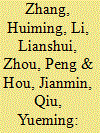

|
|
|
|
|
| Publication |
2014.
|
| Summary/Abstract |
Many countries are concerned with the waste-to-energy for economic development and societal welfare. This paper constructs a dynamic game model that, for the first time compares the incentive effects of four common subsidy modes on waste cooking oil supply for biofuel refining and sales of waste cooking oil refined products. The model considers the impact of preferential tax treatment, a raw material subsidy, a sales subsidy and an investment subsidy on the profits of biofuel enterprises and waste cooking oil recyclers. Results indicate that common approaches adopted in developed economies such as raw material price subsidies and finished products sales subsidies increase the profits of both biofuel enterprises and recyclers. On the contrary, investment subsidies, which are relatively common in some regions of China, increase the profits of recyclers, while reducing revenues achieved by biofuel enterprises. To promote the supply chain, policy should give priority to raw material price subsidies and finished products sales subsidies, and for investment subsidies, however, the government should be cautious.
|
|
|
|
|
|
|
|
|
|
|
|
|
|
|
|
| 15 |
ID:
159377
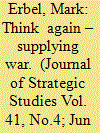

|
|
|
|
|
| Summary/Abstract |
This article argues that logistics constrains strategic opportunity while itself being heavily circumscribed by strategic and operational planning. With the academic literature all but ignoring the centrality of logistics to strategy and war, this article argues for a reappraisal of the critical role of military logistics, and posits that the study and conduct of war and strategy are incomplete at best or false at worst when they ignore this crucial component of the art of war. The article conceptualises the logistics–strategy nexus in a novel way, explores its contemporary manifestation in an age of uncertainty, and applies it to a detailed case study of UK operations in Iraq and Afghanistan since 2001.
|
|
|
|
|
|
|
|
|
|
|
|
|
|
|
|
|
|
|
|
|